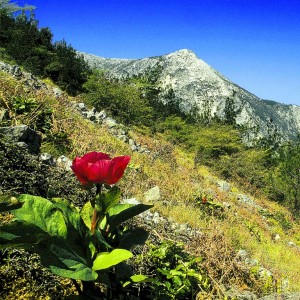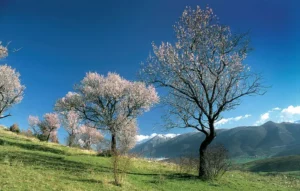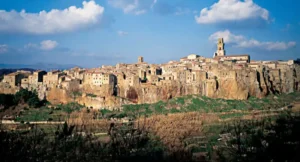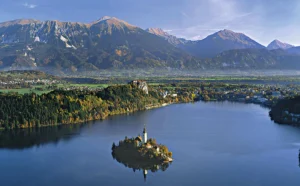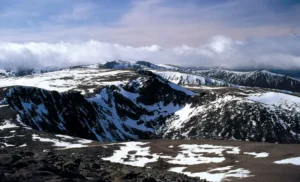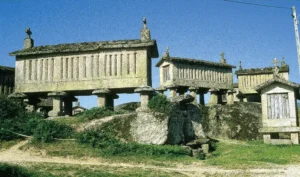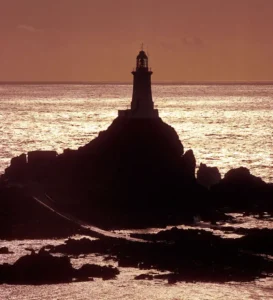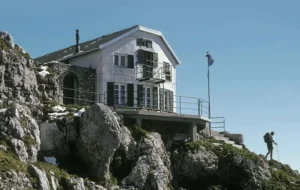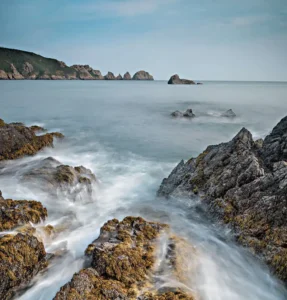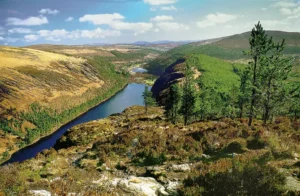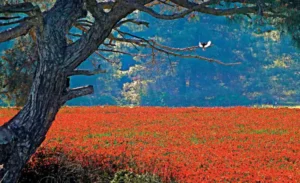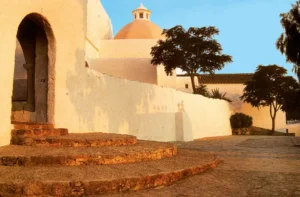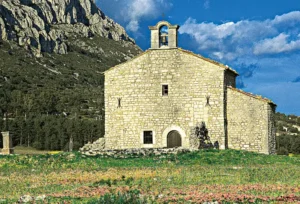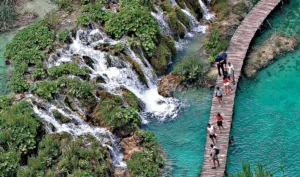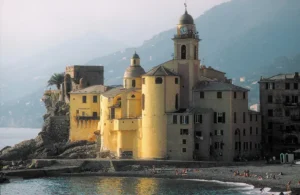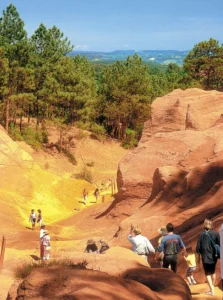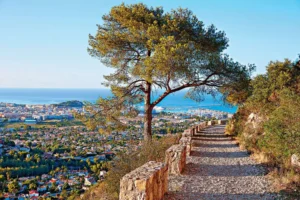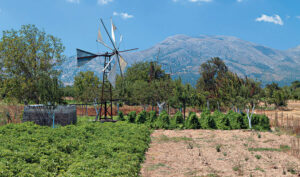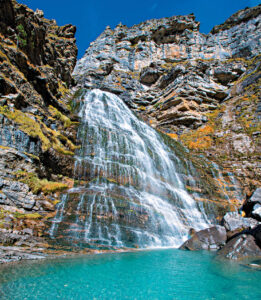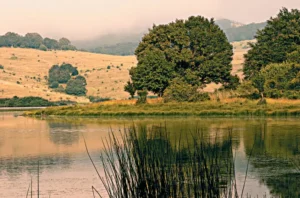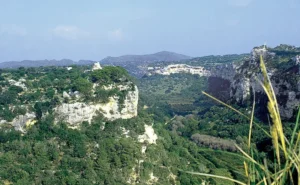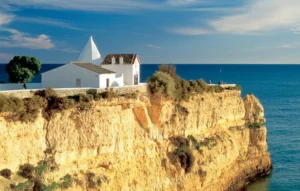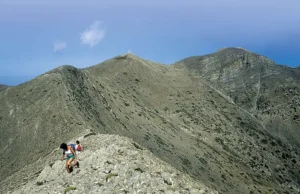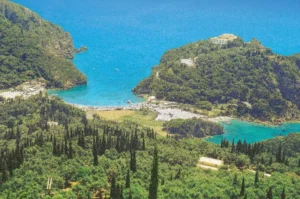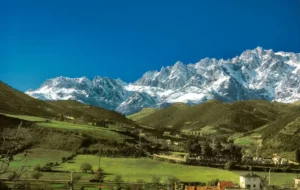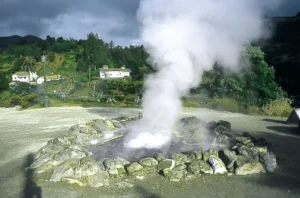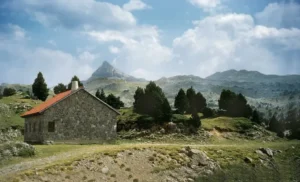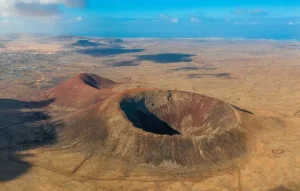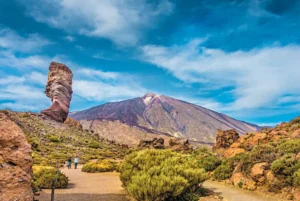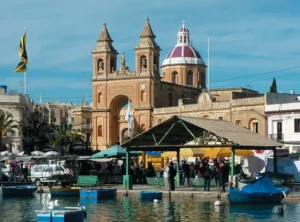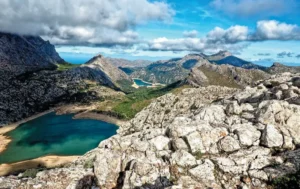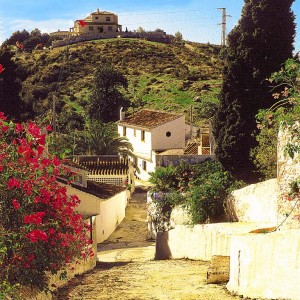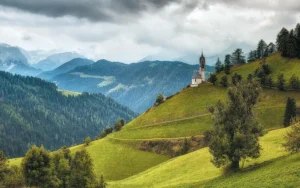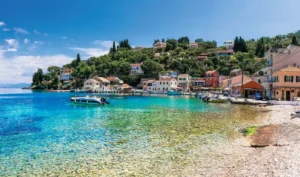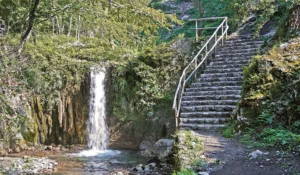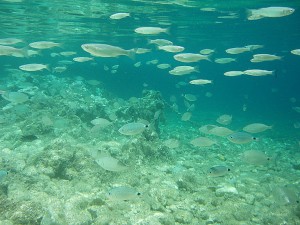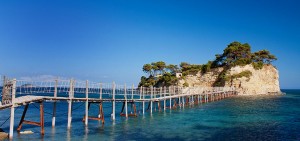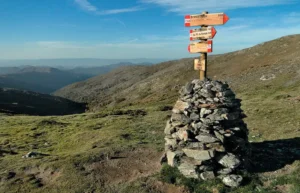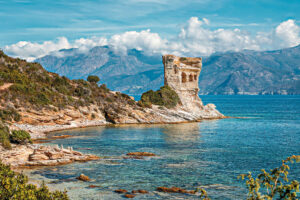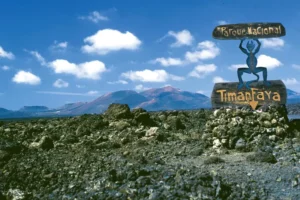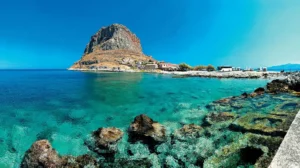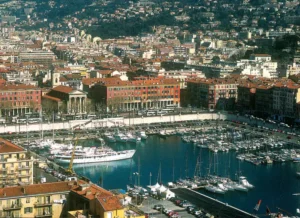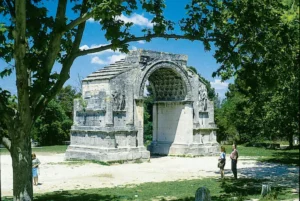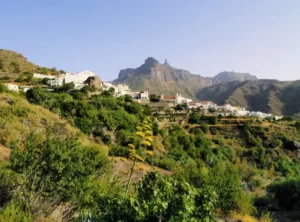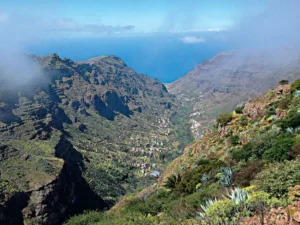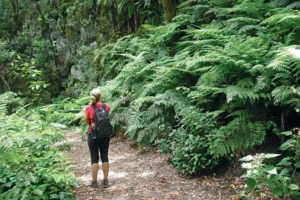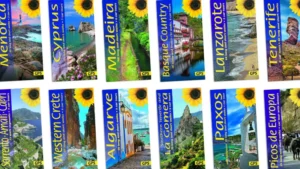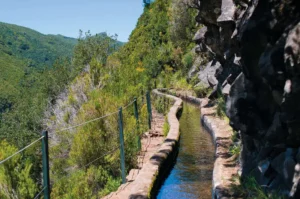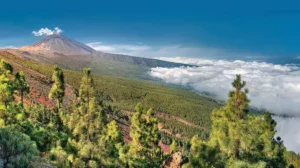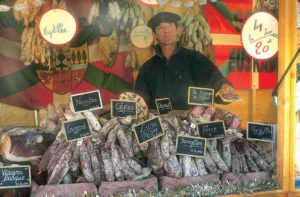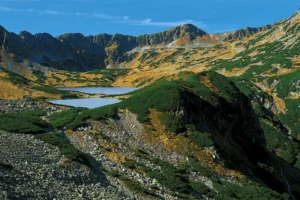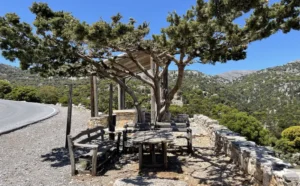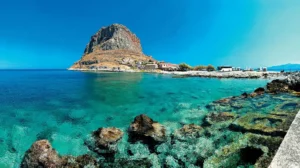Sagardotegiak – Basque cider houses
The beautiful Basque coastal city of San Sebastián (or Donostia, as all the locals call it, in Basque) is rightly famous as a Mecca for foodies. It boasts numerous Michelin-star restaurants – not bad for a city with a population of under 200,000.
Apart from the legendary pintxos (the often highly-elaborate Basque variant of the Spanish tapa), which are works of art in themselves, between mid-January and mid/late-April is cider season.
The highest concentration of sagardotegiak (cider houses) is to be found just south of the city around the town of Astigarraga.
Visiting a cider house
After spending a day following one of the walking or touring routes in our guidebook to the Basque Country, you might like to spend a raucous evening at a rustic Basque sagardotegia (cider house – the ‘k’ is added in the Basque language, Euskara, to form the plural).
A brief history of Basque cider-making
Basque cider-making goes back centuries, and in days gone by pretty much every farmstead would have its own apple press and produce cider for the immediate family, friends and neighbours.
The Basque oral tradition of verse improvisation also developed on cider-producing farms after a few glasses.
Cider production declined during the Franco era, in part due to the advent of industrialisation. There was also a move away from rural settlements towards the towns and cities. However, cider production and cider consumption are now very much on the increase.
So much so that Basque cider producers normally have to bring apples from Galicia, Normandy. In recent years they’ve also use from the Czech Republic to blend with locally-grown varieties.
The cider itself has between 5-6% alcohol content and has quite a sharp, albeit often fruity taste.
Cider house etiquette
In every sagardotegia there is a person in charge of opening the huge wooden barrels for diners. Following the cry of ‘txotx’ an orderly queue forms beside a barrel. Diners catch the cider in a tumbler glass as it pours out in a thin jet once the barrel has been opened.
The procedure is to catch just a small amount at the bottom of the glass which is downed in one before any sediment has time to form. The same principle is used further along the coast in the cider houses of Asturias.
Wooden buckets are placed in front of each barrel to catch the surplus cider that misses the glass. Locals never fill their glasses, although there is no limit on the amount of times you can return to any of the barrels for more!
Eating in a cider house
What makes cider houses of the Basque Country unique is the accompanying menu, which rarely varies. Cod omelette usually also followed by fried cod (or sometimes hake) cooked with green or red peppers. Then the pièce de résistance – a large, succulent T-bone steak cooked to perfection. Local preference is for it to be cooked rare, at times verging on raw in appearance.
Until some years ago, the tradition was for locals to take their own steaks to grill with the sagardotegia providing the rest, although now most places offer the full menu.
In the unlikely event that you’re still hungry after all this, more can be ordered! All the food is shared, making for an extremely sociable experience.
It’s totally acceptable (and even advisable) to gnaw at the meat remaining on the bone with your hands.
Dessert invariably consists of walnuts (with nutcracker included) and local Idiazabal sheep’s cheese.
In the most traditional cider houses, diners eat standing up at rustic wooden tables. This facilitates quick access to the barrels for cider refills. Usually plenty of singing goes on in these places too.
The best time to visit cider houses
The sagardotegiak only keep their barrels open to the public until around the end of April at the latest. After this time the bottling season starts.
Otherwise, once the warm weather starts, the cider would go off in the wooden casks. Stainless steel casks with thermostats are now being used to enable many places to stay open all year.
Several cider houses of the Basque Country have started to offer guided tours with tasting, without the full menu.
If you are visiting at this time of year to tour and walk with our guidebook to the walking in Basque Country, don’t miss the chance to experience the ‘txotx’ season at one of the more rustic places. Full details of which can be obtained from local tourist offices.
Buy our guidebook to walking in the Basque Country.
More Articles
Walking on Samos: a Greek island odyssey Samos, a verdant gem nestled in the [...]
Walking in Umbria and the Marche: through Italy’s green heart Umbria and the Marche, [...]
Walking in Tuscany: rolling hills and Medieval towns Tuscany, with its rolling hills, vineyards, [...]
Walking in Slovenia: a land of diverse beauty Slovenia, a small country nestled in [...]
The Scottish Highlands: a journey through wild landscapes The Scottish Highlands, a vast and [...]
Adventure in Northern Portugal Northern Portugal is a region of rugged beauty, rich history [...]
Walking on the Channel Island of Jersey The Channel Island of Jersey, located just [...]
An adventure in the Bernese Oberland & Valais The Bernese Oberland and Valais regions [...]
Adventures at the Italian Lakes The Italian Lakes, a shimmering necklace of emerald and [...]
Walking on the island of Guernsey The island of Guernsey, located in the English [...]
Walking on the Emerald Isle Ireland, with its rolling hills, rugged coastlines and charming [...]
Discover the hidden gems of Lesvos Lesvos, a picturesque Greek island in the Aegean [...]
Island walking and cycling on Ibiza and Formentera Ibiza and Formentera, two stunning islands [...]
Discover Eastern Provence Eastern Provence, a sun-kissed region in southeastern France, offers a diverse [...]
Discover Croatia’s hidden gems on foot Croatia, a stunning country with a diverse landscape, [...]
Discover the coastal charms of Cinque Terre and the Riviera di Levante The stunning [...]
Wanderlust in Western Provence Western Provence, a region of sun-drenched landscapes, historic villages, and [...]
Walking on the Costa Blanca – a Mediterranean delight The Costa Blanca, Spain’s sun-kissed [...]
Walking in Eastern Crete – a journey through time Eastern Crete, a land of [...]
The Pyrenees – a mountainous adventure The Pyrenees, a majestic mountain range that forms [...]
Discovering the walking trails of Sicily Sicily, a sun-kissed island off the southern tip [...]
Discovering the landscape of Menorca on foot Menorca, a tranquil Balearic island off the [...]
The Algarve – a coastal paradise for walkers The Algarve, Portugal’s sun-drenched southern coast, [...]
Discover the Costa Brava The Costa Brava, a stunning stretch of coastline in northeastern [...]
Western Crete – an unspoiled haven for walkers Western Crete, a rugged and unspoiled [...]
The diverse landscapes of Corfu Corfu, a jewel in the Ionian Sea, is not [...]
Conquer the Picos de Europa! The Picos de Europa, a dramatic mountain range in [...]
Discover the best walking trails in the Azores The Azores, a stunning archipelago in [...]
Discover the magic of the Basque Country The Basque Country, a captivating region nestled [...]
Fuerteventura: a walker’s paradise Fuerteventura, the second-largest of the Canary Islands, is a hiker’s [...]
Walking on Tenerife: a paradise for hikers Tenerife, the largest of the Canary Islands, [...]
Conquering Tenerife’s Teide: a guide to summiting Spain’s highest peak Tenerife, the largest of [...]
The islands of Malta and Gozo Malta and Gozo, two small islands in the [...]
A hidden gem in the Balearics The Balearic island of Mallorca, often associated with [...]
Walking through Andalucía Andalucía, with its rich history, culture, and diverse landscapes, is a [...]
Walking in the Dolomites The Dolomites, a UNESCO World Heritage Site, are a mountain [...]
Walking on Paxos: a guide to the Green Island Paxos, a small island in [...]
Hiking the mountains and coastline of Southern Cyprus Southern Cyprus, with its diverse landscapes, [...]
An introduction to walking in Sorrento, Amalfi, and Capri The Amalfi coast, a UNESCO [...]
The underwater beauty of Zákynthos In our guidebook Zákynthos, A Complete Guide with Walks, [...]
Walking on Zákynthos in the summer Sometimes the summer heat on Zákynthos makes walking [...]
Sardinia: a hiker’s paradise Sardinia, a Mediterranean island known for its stunning beaches, crystal-clear [...]
Corsica: a walker’s paradise Corsica, a Mediterranean island known for its rugged beauty and [...]
Exploring Lanzarote’s volcanic landscape: the Timanfaya guided walk Lanzarote, one of the Canary Islands, [...]
A walking odyssey in the Greece The southern Peloponnese, in Greece, is a hidden [...]
Nice: a perfect destination for winter walking Nice, a vibrant city on the French [...]
Sagardotegiak – Basque cider houses The beautiful Basque coastal city of San Sebastián (or [...]
Discovering the flysch rock formations When walking in the Basque Country, don’t miss the [...]
Glanum – a Roman town in Provence If you are walking in Provence you [...]
Gran Canaria: a continent in miniature Gran Canaria, the third-largest of the Canary Islands, [...]
La Gomera: a walking wonderland La Gomera, one of the smaller Canary Islands, is [...]
La Palma and El Hierro: hiking havens in the Canary Islands La Palma and [...]
Lanzarote: a volcanic paradise for walkers Lanzarote, the easternmost of the Canary Islands, is [...]
Over 40 years of experience in each guide Sunflower has been producing guides for [...]
Madeira: a stunning destination for walkers Madeira lies in the Atlantic Ocean off the [...]
The Canary Islands: a paradise for hikers The Canary Islands are a volcanic archipelago [...]
Navigating Tenerife: a guide to the Titsa bus service Tenerife, the largest of the [...]
A culinary and walking adventure in Provence Provence, a region in southern France renowned [...]
A walking adventure in the Tatra Mountains The Tatra Mountains, straddling the border between [...]
Eastern Crete in October: a walker’s paradise Eastern Crete, with its rugged mountains, pristine [...]
A Walking Odyssey in the Southern Peloponnese The southern Peloponnese, Greece, is a hidden [...]

